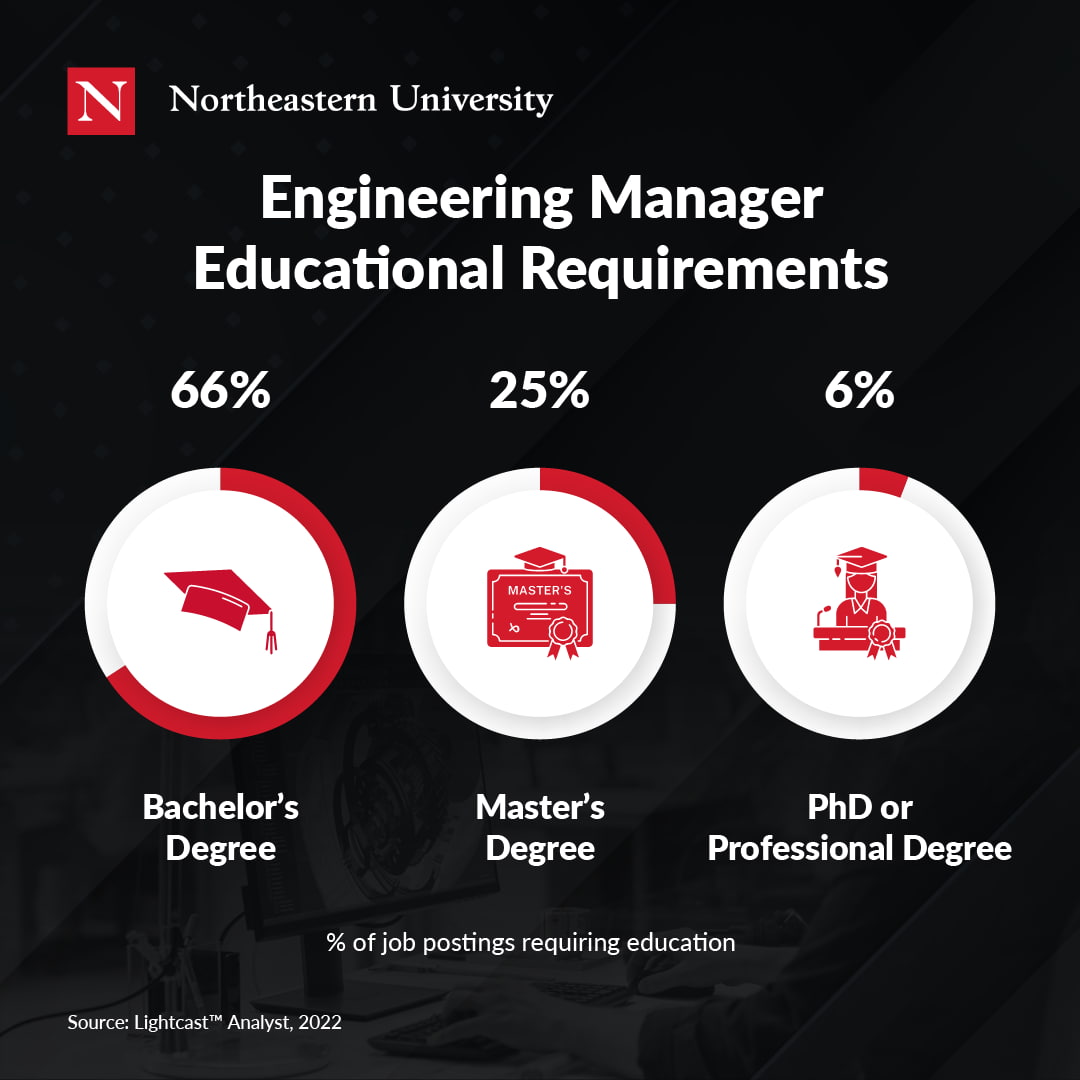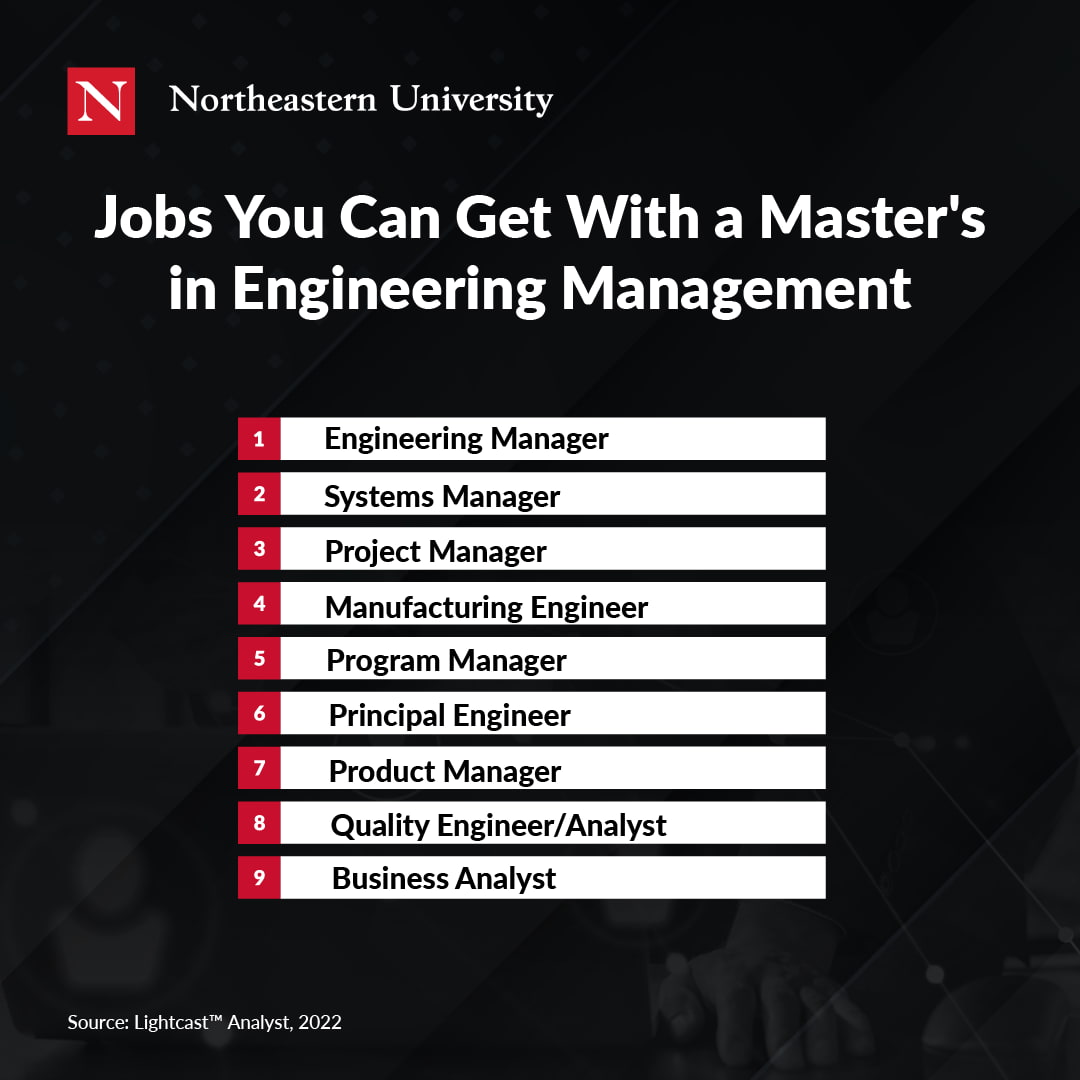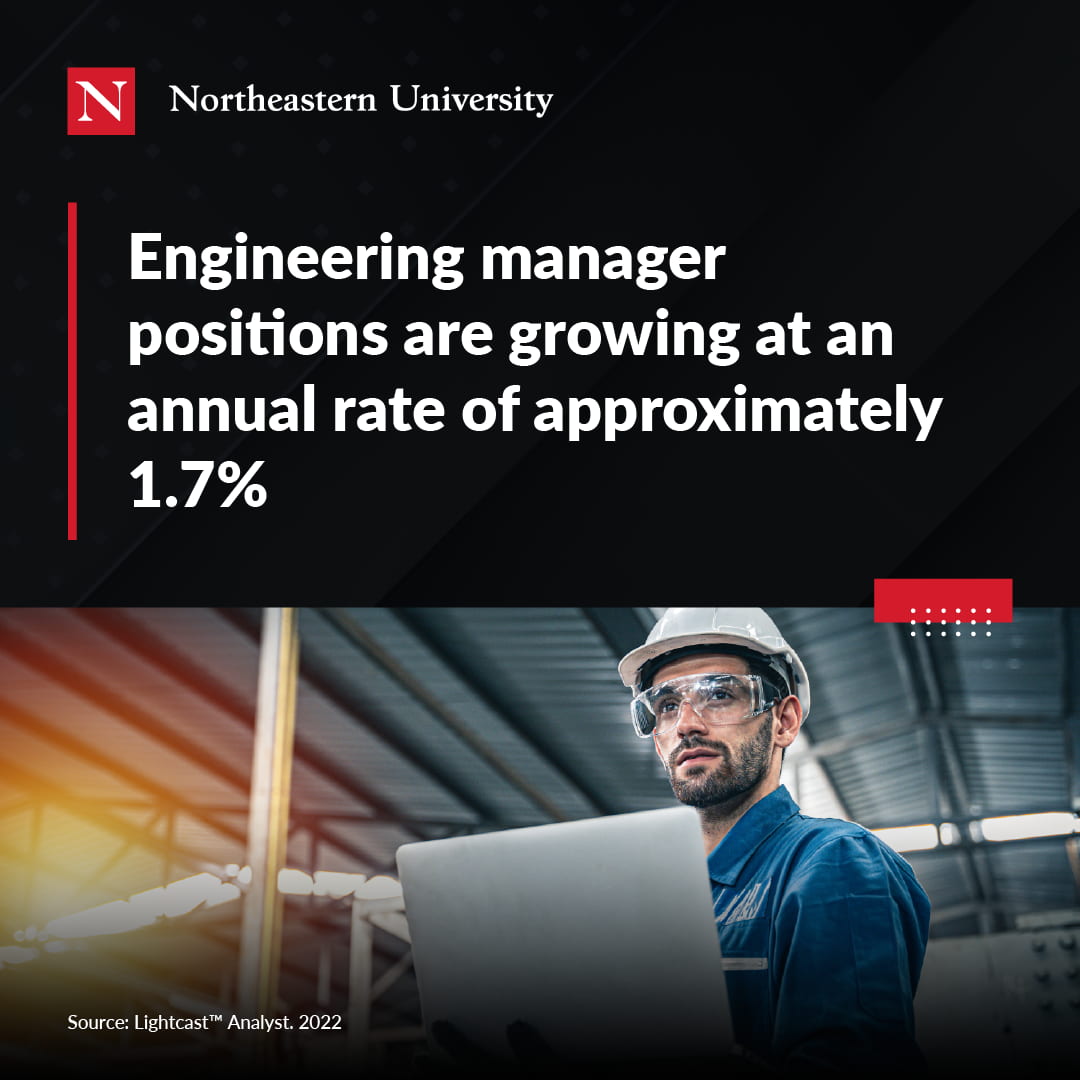With so many degree specializations available, engineering can be a difficult field to navigate as a recent graduate. There are numerous factors when choosing a career path, but among the most important aspects to consider are your long-term professional goals. A master’s degree in engineering management can prepare you for the technical demands of the field and provide a leadership foundation for the future.
If you’re wondering whether advancing your education aligns with your career goals, here’s a closer look at what engineering management is, what you can do with a master’s degree, and whether earning an advanced degree in this field is worth it.
What Is Engineering Management?
From healthcare and banking to communications and entertainment, organizations are increasingly using tech-based solutions to design and deliver products and services. As a result, businesses need more leaders who are proficient in both engineering and business management. Engineering management is meant to bridge this gap between engineering and business operations.
Engineering management is an interdisciplinary approach to training project managers, providing them with the technical background and business leadership skills needed to oversee projects and product development in various industries. Since this discipline connects many different departments, engineering management focuses on expanding proficiency in several skill sets to understand both the technical and strategic sides of development to communicate objectives to business stakeholders effectively.
Do You Need a Master’s Degree To Be an Engineering Manager?
A specialized degree is always helpful when entering the workforce but is not required. Individual employers typically determine whether or not applicants need a master’s degree in engineering management, and most employers require a bachelor’s degree and at least five years of experience, according to the U.S. Bureau of Labor Statistics.

If you don’t have a relevant undergraduate degree, however, returning to school may be a great option if you want to broaden your career options. In fact, a master’s degree can increase your earning potential by approximately 18 percent.
Jobs You Can Get With a Master’s in Engineering Management
Earning a master’s in engineering management equips you with the skills to succeed in the engineering industry. Dedicated to training technically skilled organizational leaders, the degree prepares students to navigate both business and engineering challenges. If you’re considering earning a graduate degree, here are potential job titles you can pursue as a result of advancing your education.

Engineering Manager
Engineering managers oversee engineering-based product development and the operations that support it. They’re in charge of making the best strategic choices regarding project prioritization, supply chain management, process optimization, product design, compliance protocols, and more. A master’s in engineering management is specifically designed to prepare students for this demanding role.
Systems Engineer
Systems engineers build, implement, and maintain systems involved in production, coordination, or service delivery. Combining technical and human-centered practices, systems engineers create and troubleshoot tools, systems, and processes to solve real-world problems as efficiently as possible. For this role, an engineering management degree equips you to analyze the information required to coordinate data, people, resources, and services to develop adaptable systems to satisfy complex goals.
Project Manager
Project managers work in all industries supervising company outputs, monitoring performance, and developing the most efficient workflows. A master’s in engineering management is extremely beneficial to those interested in working in engineering, technology, or manufacturing because these industries often have complex processes that require both business operations knowledge and engineering expertise.
Manufacturing Engineer
This type of engineer specifically works in manufacturing, which could be mechanical, chemical, or digital. Manufacturing engineers must have a thorough understanding of operations, material processing, equipment handling, and system maintenance associated with their manufacturing methods. A master’s in engineering management provides the in-depth engineering and managerial education needed to optimize costs, resources, processes, safety, and supply chains.
Program Manager
An engineering program manager directs all the technical, functional, and strategic processes involved in developing and executing programs and products. They decide what technologies and processes to use, guide research, and coordinate staff, stakeholders, and supply chains. An engineering management degree offers the expertise needed to gain a broad view of operations, analyze problems, and make strategic decisions.
Principal Engineer
Principal engineers are high-ranking leaders who provide direction for other engineers. They’re often considered industry authorities; therefore, principal engineers must stay current on best practices, regulations, and other changing conditions in engineering fields. An engineering management degree prepares principal engineers to be organizational leaders with the comprehensive experience and skills to align the goals of senior management, clients, and engineering teams.
Product Manager
Product managers plan and oversee a product strategy from research and conception to launch and beyond. They manage production timelines and assess product demand, user needs, and market gaps to devise solutions for developing new products and improvements to existing ones. A master’s degree in engineering management can prepare product managers to balance research, design, development, sales, and marketing objectives to deliver products that serve long-term business goals.
Quality Engineer/Analyst
A quality engineer is responsible for monitoring the quality of manufactured goods. They assess quality standards and implement solutions to meet the criteria through testing, documentation, maintenance, and risk mitigation. Quality engineers can benefit from a master’s degree because it offers industry-specific knowledge in manufacturing. For example, students learn how to put processes in place to control quality on a large scale.
Business Analyst
While analysts work in every industry, they can specialize in helping engineering businesses evaluate the competitive landscape and innovate to become industry leaders. From customers and resources to regulations and supply chains, analysts assess internal and external factors affecting the business and develop strategic ways to improve product offerings and stand out from competitors.
Is a Master’s in Engineering Management Worth It?
While earning a master’s degree can be very beneficial to your career options, there are other factors that may hold you back from advancing your education. Graduate programs take time and money to complete, so it’s important to make sure this commitment is worth the investment. Here are three factors that you should consider when applying to master’s programs.
Higher Salary Potential
Earning a master’s degree isn’t cheap, but there is plenty of evidence indicating that it’s money well spent. According to a government report, the median annual salary of engineering managers is $135,040. This is largely due to the fact that engineering managers are classified as organizational leadership roles that require extensive skills. As a result, engineering professionals who earn this degree typically command higher salaries.

Positive Job Growth
Technology is at the forefront of innovation in every industry, which means engineering professionals with interdisciplinary skill sets are becoming increasingly valuable to organizations. Government data shows that engineering manager positions grow at a rate of 1.7 percent annually. While engineering positions are growing, so are leadership roles that require engineering expertise. Earning a master’s degree expands engineers’ career options by offering management training to expedite their entry into these higher-level leadership positions.

Valuable Experience
The best master’s degree programs take an experiential learning approach, giving students the opportunity to study alongside experts in the field and apply their skills in real engineering projects. These curriculums are designed to stimulate technical, analytical, operational, strategic, and human-centered thinking to solve problems.
Earning your master’s from an accredited institution, like Northeastern’s Master of Science in Engineering Management program, can set you apart from other job candidates. Not only will you have a more robust project portfolio, but you’ll also have more industry-specific experience from experiential opportunities such as internships, networking, and job placement.
Become a Leader in the Field
The engineering field is vast and multifaceted, giving you the flexibility to mold your education to your career goals as they evolve. Whatever industry, organization, or specialization you choose, a master’s degree can help you get to the forefront of your field. Just as engineers have led the way in new technological advances, you too can take charge and learn how to lead a company into the future.
Want to become a business leader in the engineering, manufacturing, or technology industry? Check out our Master of Science in Engineering Management programs to learn more about how this degree can elevate your career.






Related Articles
11 Data Science Careers Shaping Our Future
How Data Science is Disrupting Supply Chain Management
What Does a Data Scientist Do?